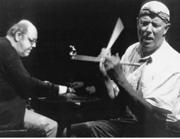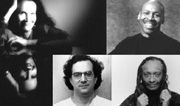LET’S JUST COME OUT and say it: Few of you reading this are going to bother to see the Instant Composers Pool Orchestra on September 5 when the octet crams into the International District’s Nippon Kan Theatre to make a rare West Coast appearance. This is a shame.
ICP Orchestra
Nippon Kan Theatre, Tuesday, September 5
Some of you will still be tired from a long weekend at Bumbershoot (an outrage), a few of you will be too lazy to attend (we won’t even acknowledge you), and most of you will wonder why anyone would bother with an improvised jazz concert performed by a big band of Dutch musicians (to this latter bunch, I dedicate this story).
You see, the Instant Composers Pool, ICP for short, isn’t just a jazz ensemble rich with history and brimming with inventive talent; it’s a grouping of incredible personalities—personalities you’d never find in the staid and cooler-than-thou world of American jazz—and comedic geniuses. And, after seeing these eight guys tear down your perception of live jazz, you might just walk away forever changed in your opinion about live music. Seriously folks, they’re that good.
Pianist Misha Mengelberg is the leader, cofounder, and brains behind the ICP, as well as the inventor of “instant composing,” his catchphrase for improvising with an ear open to the past. He’ll slyly hint at Cole Porter or Gershwin at a moment’s notice, inducing listener d骠 vu before traversing onto his next phrase. At 65, he’s the ensemble’s, and Dutch jazz’s, elder statesman. Influenced equally by the piano playing of John Cage and Thelonious Monk, Mengelberg is a trip—a chain smoking, gentle guy with a hunchback who never looks at ease on the piano bench, despite the fact he can play the heck out of it. With his legendary duet LP with the family parrot, Eeko, long-out-of-print, we’ll have to settle for his forthcoming Solo (Buzz) to hear his prodigious keyboard talents.
Mengelberg’s foil and the group’s percussionist, Han Bennink, is quite simply one of the most powerful drummers playing today—in any genre, mind you. In the late, great Clusone Trio, Bennink would steal the show from saxophonist Michael Moore and cellist Ernst Reijseger—too powerful, too loud, too funny to ignore. He starts every performance noisily, with a heart-attack inducing hit to the snare. Over the course of any performance, he’ll swing like a big band drummer, perform pratfalls that would make Victor Borge cringe, and—for the most part—have audiences begging for more. He’s 58, and recording technology has yet to find a medium capable of capturing his genius. His shtick is too funny, too loud, and too subtle to be heard well on CDs. That said, there are plenty of discs featuring him, including Eric Dolphy’s Last Date (where you’ll also find Mengelberg), recent collaborations with Ellery Eskelin (HatArt), the Clusone discs (on Gramovision), and more.
There is, of course, more to the ICP than just these two legendary friends. The horn section of Michael Moore, Ab Baars, and Wolter Wierbos is a trio of world-class improvisers, as is the string section of American Mary Oliver and Tristan Honsinger. Collectively, they work as a unit—sometimes stuck on a catchy theme, occasionally a ramshackle mob that struggles to musically agree upon anything. More often than not, they do agree; the results are awe-inspiring, making them one of the most innovative big-band jazz ensembles since Duke Ellington’s.
On record, you can hear the ICP in a handful of different lineups, paying tribute to jazz legends such as Thelonious Monk, Herbie Nichols, and Duke Ellington, or doing their own thing. But the group needs to be seen live, where the organic flow of their set slowly unfolds. In his book New Dutch Swing (Billboard), jazz critic Kevin Whitehead explains, “ICP’s music drifts from one locus to another like the action of a dream, where the guiding intelligence may thwart rational progress. . . . From one performance to a next, a piece may sound radically different.”
It’s true, improvised music isn’t usually this fascinating. There are no free-jazz sax bleats here; no John Zorn attitude; no intellectual discourse on where the notes are coming from. Instead, by referencing past masters and truly collaborating on the uncharted new stuff, the ICP does, somehow, compose instantly. And what, exactly, is instant composing? Go see for yourself.






